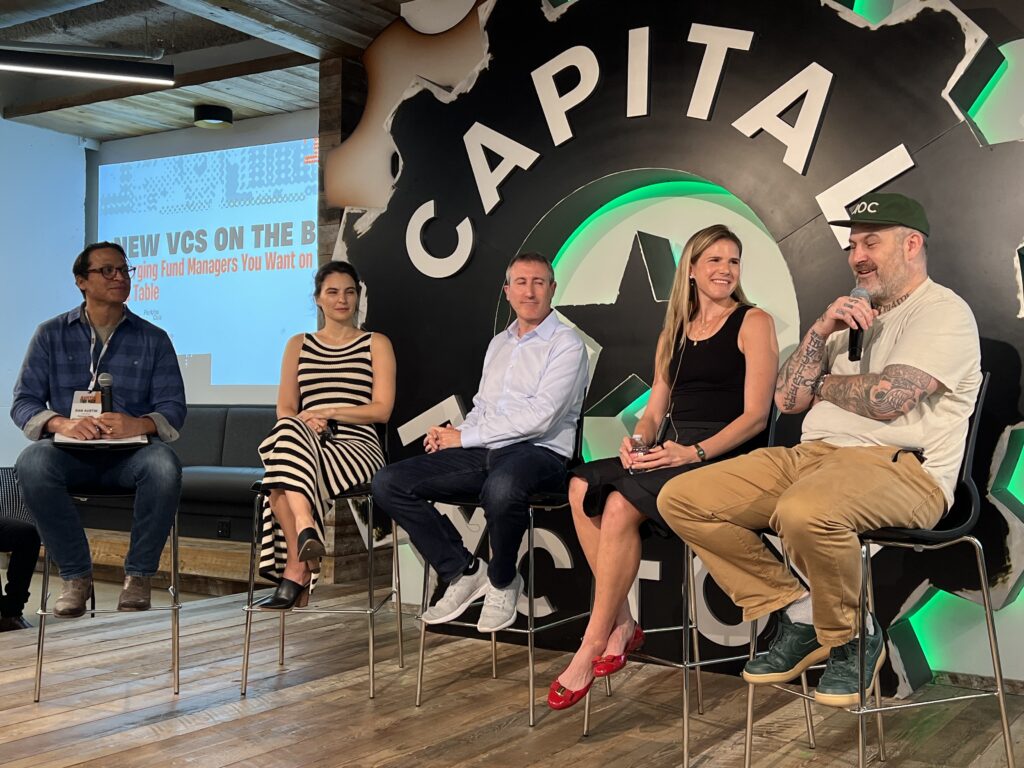
At an Austin Tech Week panel hosted at Capital Factory on Wednesday morning, emerging Venture Capital fund managers discussed why they’re betting on Austin and shared candid advice for founders seeking early-stage investment.
The “New VCs on the Block” panel, moderated by Perkins Coie partner Dan Austin, featured partners from several newer investment firms, including Firebrand Ventures, FirstMile Ventures, Rock Yard Ventures, and Runtime Ventures.
The investors highlighted Austin’s collaborative spirit as a key draw. “There’s this swell of energy, something happening here,” said Daniel Dart of Rock Yard Ventures.
FirstMile Ventures’ Zaz Floreani expanded this sentiment to Texas as a whole, noting that the welcoming atmosphere extends to Dallas and Houston’s startup scenes. According to Crunchbase, FirstMile Ventures focuses on seed and pre-seed investments in software, IT, and SaaS industries, primarily in Colorado. The firm has invested in 58 startups and raised $30.6 million.
For Runtime Ventures, which specializes in cybersecurity investments, Austin’s growing cybersecurity ecosystem makes it an attractive market. “More and more companies and cyber professionals are coming to town,” said David Endler, who’s lived in Austin for over 20 years. “The community here is collaborative, which isn’t true for every city.”
When discussing how founders should approach VCs, the panel emphasized authenticity over perfection. Floreani offered a “spicy take,” stating that VC value-add is often overstated. “Companies are built and sold by founders and their teams,” she said, suggesting that VCs’ principal value is helping companies prepare for future funding rounds and providing guidance during difficult times.
It’s tough to get funding, said Dart. Generally, the funder controls power dynamics. Rock Yard Ventures sees about 5,000 deals a year, and 10 of those are highly competitive, Dart said.
“The reality is like if people are gonna give you fucking money, take it,” Dart said.
According to Fundera, less than 0.05% of startup businesses receive venture funding.
The investors also addressed common questions about timing and prerequisites for funding. Claire Hansen of Firebrand Ventures explained that while definitions of funding stages are shifting, the seed sage typically means having a sellable product with some beta or full customers. At the same time, pre-seed usually involves companies that are still focused primarily on product development.
Firebrand Ventures, founded in 2016, has raised $57.7 million, with the latest $40 million fund announced in 2021. According to FundingTrip.com, it has invested in 27 companies in Austin, Boulder, Denver, Chicago, Des Moines, and Kansas City.
Regarding artificial intelligence, the panel agreed that not every startup needs to be an AI company. However, they look for founders who understand how to leverage AI to make their operations more efficient, regardless of industry focus.
The discussion concluded with practical advice for founders: know your target investors, do your homework, and understand that warm introductions still matter. Dart said, “If we think we can make money off you, that’s our job. We’re also very accessible – that’s also our job.”

